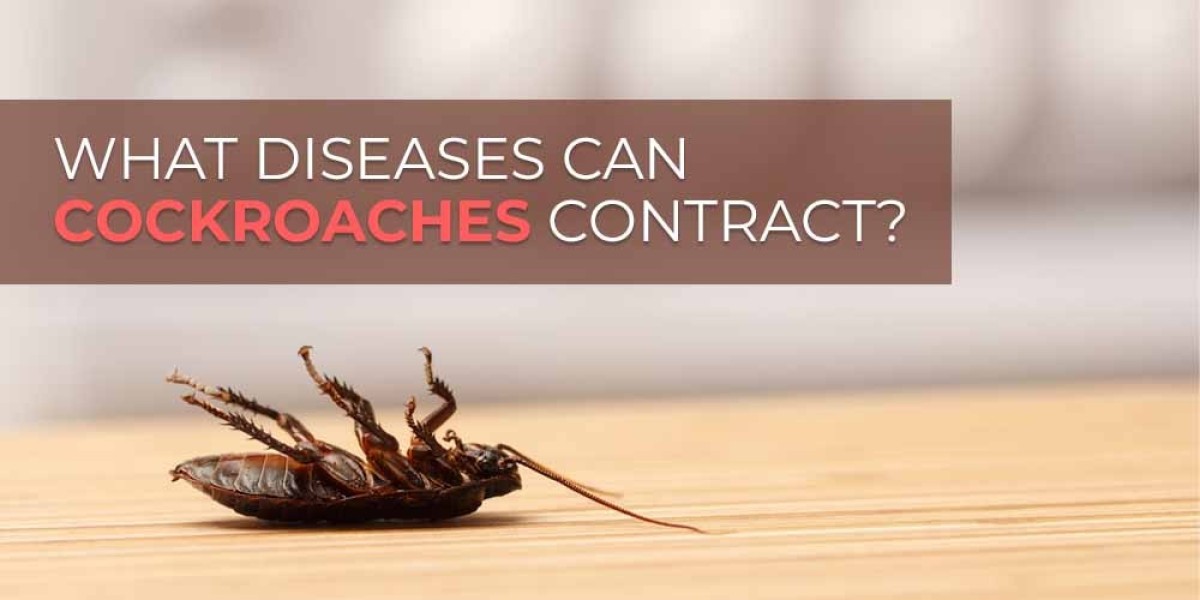Cockroaches are more than pesky insects that scurry around your kitchen at night; they can seriously threaten human health. With a history dating back millions of years, these resilient insects can thrive in almost any environment, from sewers to clean homes. As nocturnal creatures, they often move about at night, consuming everything from food to paper to glue. Unfortunately, cockroaches can also carry and spread various diseases to humans. This article will explore several of the most significant cockroach-related disorders and how they could affect people.
Common diseases in cockroaches
Cockroaches can carry and spread various diseases, making them a potential health hazard. Here are some of the most prevalent cockroach diseases and how they could affect people's health.
A. Bacterial diseases
Salmonella
One kind of bacteria that can make people sick from eating is salmonella. Humans can contract bacteria from contaminated food or drink through cockroaches. Salmonella infections can cause diarrhea, fever, and pains in the abdomen. When the condition is severe, it can cause dehydration and necessitate hospitalization.
Escherichia coli (E. coli)
E. coli is another type of bacteria that can cause severe diarrhea and vomiting. Cockroaches can carry and transmit this bacteria through feces or crawling on contaminated surfaces. E. coli infections can lead to dehydration and require medical attention.
Shigella
Shigellosis, which can result in diarrhea, fever, and cramps, is brought on by a particular form of Shigella. Shigella can be carried and spread by cockroaches through their droppings. The infection may cause dehydration in extreme circumstances and call for medical attention.
B. Viral diseases
Poliomyelitis
Poliomyelitis is a viral disease that can cause paralysis. Cockroaches can pick up the virus from contaminated feces or water and transmit it to humans. The virus attacks the nervous system and can cause permanent paralysis or death.
Hepatitis A
The viral illness hepatitis A damages the liver. By polluting food or surfaces, cockroaches can spread the infection. Hepatitis A infection symptoms include nausea, vomiting, fever, and stomach pain. When the illness is severe, it might cause liver failure and necessitate hospitalization.
Norovirus
The norovirus is a contagious virus that can inflame the stomach and intestines and cause gastroenteritis. Humans can contract the virus from cockroaches by drinking or eating contaminated food. Vomiting, diarrhea, and cramps are all signs of norovirus infection.
C. Fungal diseases
Aspergillosis
Aspergillosis is a fungal disease that can cause lung infections in humans. Cockroaches can carry and transmit this fungus through feces or crawling on contaminated surfaces. Aspergillosis is more likely to affect those with compromised immune systems.
Candidiasis
Candidiasis is another type of fungal disease that can cause infections in humans. Cockroaches can carry and transmit this fungus through feces or crawling on contaminated surfaces. Symptoms of Candidiasis can include rashes, itching, and burning sensations.
Dermatophytosis
Dermatophytosis is a fungal infection affecting skin, hair, and nails. Cockroaches can carry and transmit this fungus through feces or crawling on contaminated surfaces. Symptoms of Dermatophytosis can include itching, redness, and skin flaking.
Transmission of cockroach diseases
Cockroaches can transmit diseases through direct and indirect contact with their excrements.
A. Direct transmission
Cockroaches can directly transmit diseases to humans when they come into contact with them or their food. When a cockroach crawls on food or utensils, it can contaminate them with bacteria or viruses on their body or feces. If a person consumes this contaminated food or touches the contaminated utensils and their mouth, they can become infected.
B. Indirect transmission
Feces from cockroaches can contaminate kitchenware, kitchen cabinets, and countertops. The germs or viruses in the garbage can be passed to hands when someone touches these contaminated surfaces. They might become infected if they feel their mouth, nose, or eyes.
C. Fecal-oral transmission
When cockroaches crawl on food or water, they can leave fecal matter that contains disease-causing bacteria, viruses, or fungi. If a person ingests this contaminated food or water, they can become infected with the pathogens. It can happen when cockroaches crawl on food in the kitchen or contaminate water sources. Additionally, cockroach feces can contaminate food during storage or transportation, leading to fecal-oral transmission of diseases.
Prevention of Cockroach Diseases
It would be best to avoid cockroach infestations to safeguard your health and those around you. To stop the spread of disease, you can take several precautions, including keeping your house or place of work dry and clean, hiring a reputable pest control company, and handling and storing food correctly. The most excellent methods for preventing cockroach infestations and the diseases they can carry are listed below.
A. Sanitation measures
Proper sanitation is critical to keeping cockroach infestations at bay. Cockroaches are attracted to dirty and moist environments, so keeping your home or business clean and dry is the best way to avoid an infestation. Regular cleaning should include removing food waste and keeping surfaces clean, fixing leaks, and reducing clutter.
B. Pest control measures
If you have a cockroach infestation, it's essential to take action quickly to prevent the spread of diseases. Hiring a professional pest control service is the best way to eliminate cockroaches in your home or business. A professional pest control service will use safe and effective methods to remove cockroaches and prevent future infestations.
C. Proper food handling and storage
Cockroaches can easily contaminate food and food preparation surfaces, leading to the spread of disease. Storing food properly in sealed containers and cleaning up spills and crumbs is essential to prevent this. Additionally, it's important to properly handle and cook food to avoid the spread of foodborne illness.
Cockroach Prevention Saves Lives!
In summary, cockroaches can transmit various diseases to humans through direct and indirect contact with insects and their feces, making them carriers of these diseases. The most common conditions include salmonella, E. coli, and poliomyelitis. Additionally, cockroach infestations can trigger allergic reactions and worsen respiratory problems. Therefore, preventing cockroach infestations is crucial for safeguarding the health of individuals and communities. Achieving this requires maintaining cleanliness and dryness in homes and businesses, hiring professional pest control services, and practicing proper food handling and storage.
We recommend that those looking for roaches pest control in Hametown, PA, choose a professional service that can effectively remove cockroaches and prevent future infestations. Preventing cockroach infestations can significantly reduce the risk of disease transmission and promote a healthy living environment. By following the aforementioned preventative measures, individuals can protect themselves and those around them from the harmful effects of cockroach infestations.








